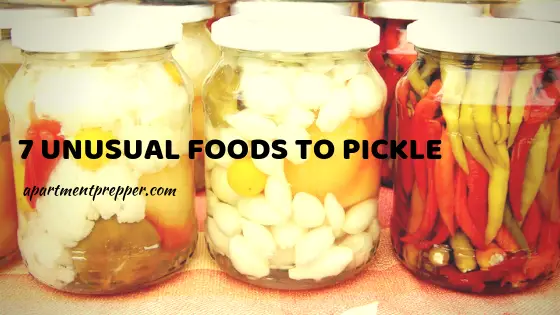(Editor’s note: Pickling is one homesteading activity that can easily be done in an apartment. I had pretty good results making Marinated Mushrooms, so I think I am going to try making some of these recipes myself. If you have any great pickling recipes to share, please let us know in the comments!)
Written by Shelle, Rockin W Homestead
Pickling may be the new Kale! I’ve been on a pickling kick the past month or so and discovered several fun ways to preserve food that we do not often expect to be pickled. I haven’t tried all these recipes, but they certainly sound and look wonderful and I’m excited to add them to our pantry.
Why Pickling?
Pickling is one of the oldest forms of food preservation. It involves submerging the food in either vinegar or a salt brine to keep it from spoiling. Spoiling is a process that involves bacteria, and not all bacteria are created equal when it comes to spoiling or preserving food.
The brilliance with pickling is that it prevents the bad bacteria from growing.
Eating pickled foods on a regular basis is good for you and your overall health.
Pickling is also one of the more cost-effective ways to preserve food.
The same type of food can be pickled in a few different ways.
Vinegar or Brine Pickling
In the case of using vinegar to pickle, the high acidity of the vinegar prevents most bacteria from thriving, thus preserving the food as long as it is submerged in the vinegar solution.
With brine pickling, controlled fermentation is encouraged like in the case of sauerkraut and kimchi. This allows beneficial bacteria to grow, who then crowd out any bad bacteria that will cause the food to spoil. The interesting thing is that the look, texture, and flavor of the food changes.
Let’s take pickled cucumbers for examples, one of the most popular pickled foods in the US (at least if you consider the variety of different pickles in the grocery store).
Kosher pickles are the perfect example of cucumbers being preserved in a vinegar solution. Most dill pickles, on the other hand, are preserved in brine. While that mixture may include vinegar, it also includes dill and other pickling spices and salt.
Seven Unusual Foods to Pickle
Believe it or not, fruit is a perfect candidate for pickling. Fruit ripens quickly and pickling can be a good way to preserve it if you can’t use it all. Also, the natural sugars in fruit work as a perfect complement to the salty and sour components introduced by the pickling process. Pickled fruits all make wonderful accompaniments to salads and cheese plates.
Enjoy these recipes for unlikely items to pickle
Curry Pickled Eggs from Rockin W Homestead
Spicy Pickled Pumpkin from Putting up With Erin
Quick Pickled Apples from Food52
Easy Refrigerator Pickled Peaches from Delightful Adventures
Delicious Spiced Quick-Pickled Grapes from Nerds with Knives
Salt and Vinegar Lemons from Just a Pinch
Quick Pickled Spiced Cranberries from Gourmande in the Kitchen
About the Author:
Shelle writes Rockin W Homestead. She is the author of Prepper’s Dehydrator Handbook, Long-term Food Storage Techniques for Nutritious, Delicious, Lifesaving Meals available on Amazon


These sound amazing, and I’m going to try these! Thanks for the article! Respectfully, The Break Away Homesteader.
Great! Come back and let us know how they turned out. Thanks for the comment.